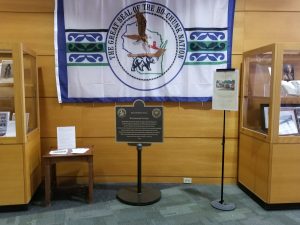Our Shared Future – What It Means to Our Campus
~ Lisa Carter, Vice Provost for Libraries and University Librarian
I was pleased with the turnout for our December program featuring a panel on the Our Shared Future Initiative. Our presenters, Kyla Beard, Brian McInnes, Adrienne Thunder, and Omar Poler, reflected on the work required to create shared understanding behind the names, words, and concepts of communities and people of different backgrounds. They shared how the University and Wisconsin’s Native Nations could work together to strengthen the knowledge about the difficult history of Wisconsin and create an understanding that respects the Native Nations’ sovereignty and embeds native people’s perspectives throughout our environment and endeavors.

We were fortunate to have this panel as the Libraries hosted the Our Shared Future heritage marker. Heather Shimon coordinated a beautiful exhibit featuring the Ho-Chunk national flag with library resources by and about Wisconsin’s native people. There were also displays in the Art, Law, and Steenbock libraries.
The Our Shared Future website recently added features on the resources and primary sources pages: A map of Ho-Chunk villages and campsites in Teejop is particularly striking and shows how UW-Madison occupies ancestral Ho-Chunk land.
The Libraries will continue to partner on opportunities to learn about Native Nations culture. On Thursday, January 30, from 12:30-1:30 pm in Memorial room 126, the Libraries will host Emily Pfotenhauer and Erin Hughes from WiLS as they share about the Mukurtu content management system and efforts to enable communities to manage and share their digital heritage in ways that resonate with them culturally. As we lead the campus in curating, preserving, and sharing knowledge, this program offers new ways to look at the work we do every day.
On Thursday, February 13, from 2-3:30 pm in 4207 HC White Hall, we are coordinating with the iSchool, and a TLAM student group on a panel about the cultural preservation work of the Hoocąk Waaziija Haci Language Division and Ho-Chunk Nation Museum and Cultural Center, and how the iSchool’s TLAM program provides transformative engagement for emerging librarians. The TLAM program provides a model of mutually beneficial, community-engaged learning and impact.
I want to thank the tremendous work of the Libraries’ Equity & Diversity Committee’s leadership. Through their efforts, we continue to participate in arranging and hosting these opportunities, which directly relate to the Libraries’ Diversity Strategic Plan Goal 4: Develop and sustain a culture that reflects and honors diversity in its personnel, collections, services, and spaces.
I look forward to attending these sessions to broaden my perspective and hope you will join me.